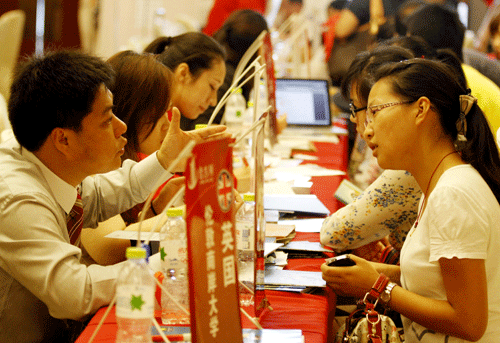Old views are changing on overseas education
|
Visitors consult information on studying abroad at an international education exhibition in Nanjing, Jiangsu province, in July. About 90 universities from 12 countries took part in the exhibition. Dong Jinlin / for China Daily |
Gan Xiaoying has only one regret about sending her 15-year-old son to study overseas: She will miss him too much.
"It will be hard, but it's worth it," said the Chongqing mother, whose son will start at a British boarding school in fall.
"I trust the Western education system, and I hope he'll adapt to the environment and culture quickly," she said, adding that she believes the younger a child goes abroad, the better.
Although it's not a sentiment that has universal support in China, data suggest more people are turning away from the traditional belief that overseas study should be reserved for postgraduates.
A poll for the latest China Education Xiaokang Index found that almost 40 percent of Chinese believe that the best time for someone to study abroad is at the undergraduate level, while about 21 percent said it is during high school.
Only 17 percent stick with the traditional idea of students not going overseas until they have bachelor's degrees, and about 4 percent said it should be at the post doctoral level, according to the report compiled by Xiaokang, a State-run magazine.
As the average age of Chinese students going abroad has dropped, so too has the number of youths taking the gaokao, or national college entrance exam.
About 9.15 million high school students nationwide took the make-or-break test in June, 180,000 fewer than in 2011. This is the fourth consecutive year that the number has fallen.
The number of high school students in major cities who opted out of the gaokao for overseas study increased by 20 percent last year compared with 2010, according to a 2011 trends report by the China Education Association for International Exchange.
The popularity of overseas English tests echoes the trend.
Educational Testing Service, a private, nonprofit educational testing and assessment organization in the United States, announced in February a 19 percent increase in the number of Chinese taking the TOEFL exam in 2011 from the prior year, marking the largest number of Chinese TOEFL test takers ever. ETS has also developed a TOEFL Junior test for younger test takers.
China is the greatest student export source for many countries. In the US, 127,628 students from China attended colleges or universities in the 2009-10 school year, marking the largest international student population, according to the Open Doors 2010 Report on college demographics for international students, released by the Institute of International Education, a nonprofit agency that offers policy research and education exchange program in the US.
William Vanbergen, founder of British Education, a Shanghai-based education consulting company, told China Daily that young children find it easier to get accustomed to foreign environments and cultures.
"The younger they go, the easier for children to pick up the way of thinking and language," he said.
The pressure of gaokao is another key reason for parents to send their children abroad earlier.
Rupert Hoogewerf, founder of Hurun Rich List, said students go abroad to study at a younger age because of worries about gaokao.
"There is no guarantee that if a student does well in gaokao, he or she will be a success in life," said the Briton. "To get success, other abilities are needed, such as leadership, innovation ability, communication skills, etc. And these schools are quite good at building these skills."
However, Xia Xueluan, a retired professor of sociology at Peking University, sounded a note of caution, warning that sending kids overseas when they are too young could cause problems.
"It is better for children to go when they can manage themselves well," Xia said, adding his opinion that the best age to go study abroad is graduate level.
He said many misunderstandings of Chinese education currently exist. "Chinese foundational education is firm," he said.
luowangshu@chinadaily.com.cn



















